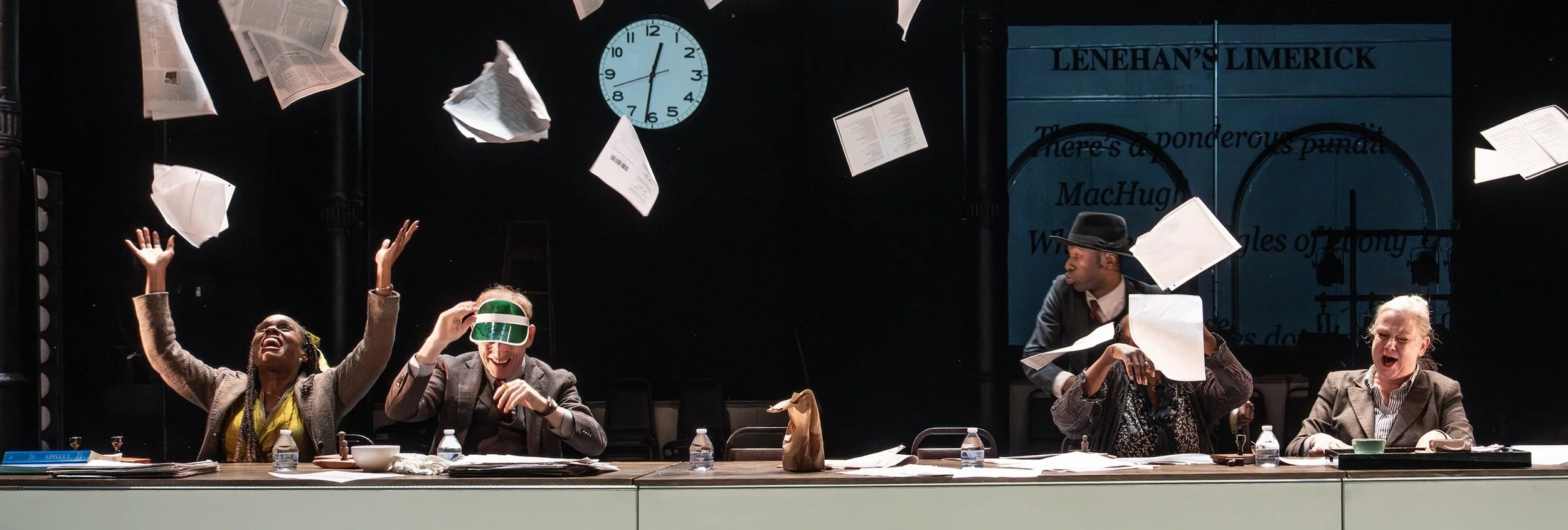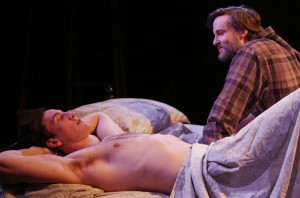In an author's note, dramatist Vincent Sessa says that his Body of Words is based on the homecoming of Odysseus. That may not be much help to anyone who knows The Odyssey, since there are only two characters, an older and a younger man, and as the play opens they’ve just completed a bout of sex. Is this a “gay play”? The older man, Norman, says that “being straight is what attracts one straight man to another. In fact, it’s what we see in each other.” If that viewpoint seems odd, it’s apparently common enough to have been used on an episode of the FX network’s animated series Archer, when Archer’s old chum is gay only for him.
The play opens at a sparely furnished beach house (by David L. Arsenault) on the heels of a fourth sexual encounter between Bruch Reed’s Norman and Boyd (Marek Pavlovski), the younger man. Norman has paid Boyd $1,000 for five acts of fellatio. Boyd—he’s purportedly 17, but Pavlovski looks a decade older—resists anything else, but Norman is offering another $500 for the whole nine yards, as it were.
In spite of their intimacy to this point, the men go at each other verbally in a way that seems preposterous but crucial, given the necessity of Sessa’s making some dramatic hay of it all. Boyd’s sudden threats of violence might make any sane person show him the door. They serve only to keep Norman interested. But if Norman and Boyd are so antagonistic before this last sexual encounter, is it because they skipped conversations between the first four? How else to explain the notion that Norman would not have noticed Boyd’s persistent threats of violence? During the play he and Boyd box and grapple intensely, and Boyd repeatedly explodes in a fury. Yet Norman calmly pursues him; perhaps it's an indication of his confidence in the power of words, but it is not credible.
Any relation to Homer beyond the invoked references to his epic is tenuous. Norman claims a varied work history: “Construction. Demolition. An oil rig. A year on the North Sea, about seven months in the Gulf of Mexico. I rebuilt levees. Put in an irrigation system. Counted the caribou on the tundra. Sometimes I just loafed. Beached the beach and the pretty beach girls. I taught native-American children once.” The adventures read as a modern parallel to those of Odysseus that delayed his return from Troy for 10 years. But the references to the “wine-dark sea” and the “rosy-fingered dawn” and even a cutesy “Ithaca Tool & Die Company” feel arbitrary. Those homages (there are also references to O. Henry and Moby-Dick) are meant to lend the story a weight it can’t bear.
At times sexual psychology is in play, as the men discuss whether they are straight or not. Boyd challenges Norman for keeping his clothes on during their sex: “How can you feel anything if you keep your clothes on!” There is a roiling element of pacifist politics as well. Boyd’s father is a military man who neglects his family but Boyd is planning to enlist the following morning, yet he has mixed feelings about his father. Norman, a Bronze Star recipient, says, “A soldier doesn’t die in glory—he dies in the blood that leaves him…” If the point seems muddled, Sessa’s writing at times includes fine isolated passages, notably one about the danger posed by a man running close rather than far back or far ahead.
The pace of director John Michael DiResta’s production is sometimes hasty, but he has gotten committed performances from both actors, who nonetheless have a struggle to make the diffuse story hang together and the characters credible. Reed delivers the more intellectual and literary references confidently, and he looks the part of a former decathlete. Pavlowski is by turns sullen, suspicious, cocky, and confident, and physically could be the wrestler he claims to have been. But the point of it all is unclear: even a classic Greek dramatic twist at the end doesn’t provide elucidation—or catharsis.
Body of Words plays through Jan. 25 at Theater for a New City (155 1st Avenue between 9th and 10th Streets). Evening performances are Wednesday through Saturday at 8 p.m.; there is also a Sunday matinee at 3 p.m. Tickets are $5–$18 and may be purchased by visiting www.theaterforthenewcity.net or www.smarttix.com.








